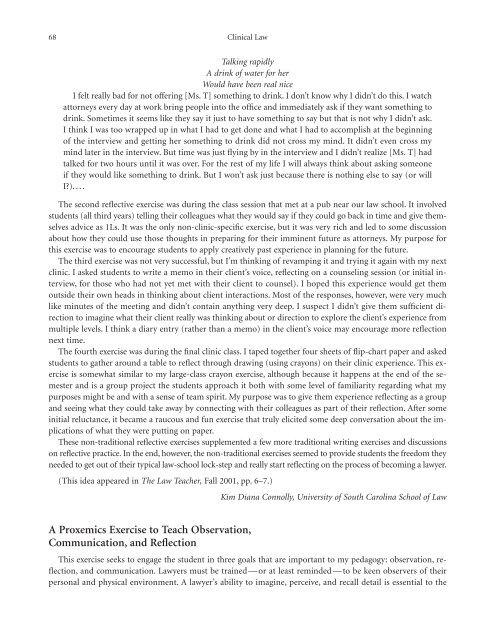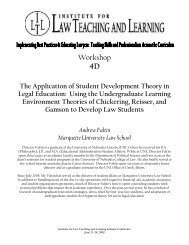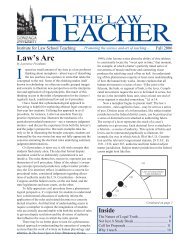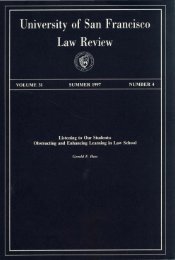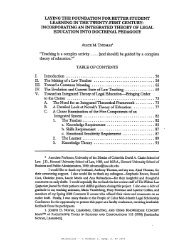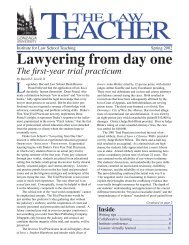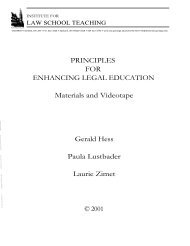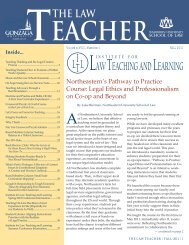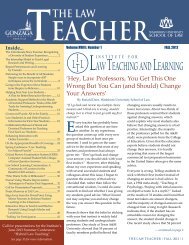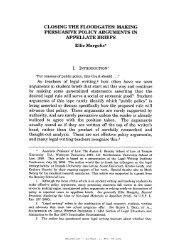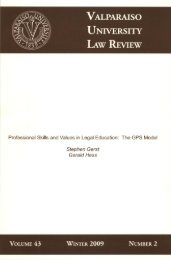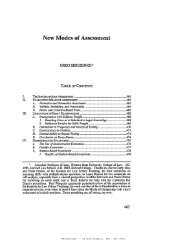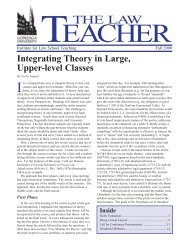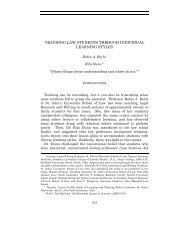Teaching the Law School Curriculum - Institute for Law Teaching ...
Teaching the Law School Curriculum - Institute for Law Teaching ...
Teaching the Law School Curriculum - Institute for Law Teaching ...
You also want an ePaper? Increase the reach of your titles
YUMPU automatically turns print PDFs into web optimized ePapers that Google loves.
68 Clinical <strong>Law</strong><br />
Talking rapidly<br />
A drink of water <strong>for</strong> her<br />
Would have been real nice<br />
I felt really bad <strong>for</strong> not offering [Ms. T] something to drink. I don’t know why I didn’t do this. I watch<br />
attorneys every day at work bring people into <strong>the</strong> office and immediately ask if <strong>the</strong>y want something to<br />
drink. Sometimes it seems like <strong>the</strong>y say it just to have something to say but that is not why I didn’t ask.<br />
I think I was too wrapped up in what I had to get done and what I had to accomplish at <strong>the</strong> beginning<br />
of <strong>the</strong> interview and getting her something to drink did not cross my mind. It didn’t even cross my<br />
mind later in <strong>the</strong> interview. But time was just flying by in <strong>the</strong> interview and I didn’t realize [Ms. T] had<br />
talked <strong>for</strong> two hours until it was over. For <strong>the</strong> rest of my life I will always think about asking someone<br />
if <strong>the</strong>y would like something to drink. But I won’t ask just because <strong>the</strong>re is nothing else to say (or will<br />
I?). ...<br />
The second reflective exercise was during <strong>the</strong> class session that met at a pub near our law school. It involved<br />
students (all third years) telling <strong>the</strong>ir colleagues what <strong>the</strong>y would say if <strong>the</strong>y could go back in time and give <strong>the</strong>mselves<br />
advice as 1Ls. It was <strong>the</strong> only non-clinic-specific exercise, but it was very rich and led to some discussion<br />
about how <strong>the</strong>y could use those thoughts in preparing <strong>for</strong> <strong>the</strong>ir imminent future as attorneys. My purpose <strong>for</strong><br />
this exercise was to encourage students to apply creatively past experience in planning <strong>for</strong> <strong>the</strong> future.<br />
The third exercise was not very successful, but I’m thinking of revamping it and trying it again with my next<br />
clinic. I asked students to write a memo in <strong>the</strong>ir client’s voice, reflecting on a counseling session (or initial interview,<br />
<strong>for</strong> those who had not yet met with <strong>the</strong>ir client to counsel). I hoped this experience would get <strong>the</strong>m<br />
outside <strong>the</strong>ir own heads in thinking about client interactions. Most of <strong>the</strong> responses, however, were very much<br />
like minutes of <strong>the</strong> meeting and didn’t contain anything very deep. I suspect I didn’t give <strong>the</strong>m sufficient direction<br />
to imagine what <strong>the</strong>ir client really was thinking about or direction to explore <strong>the</strong> client’s experience from<br />
multiple levels. I think a diary entry (ra<strong>the</strong>r than a memo) in <strong>the</strong> client’s voice may encourage more reflection<br />
next time.<br />
The fourth exercise was during <strong>the</strong> final clinic class. I taped toge<strong>the</strong>r four sheets of flip-chart paper and asked<br />
students to ga<strong>the</strong>r around a table to reflect through drawing (using crayons) on <strong>the</strong>ir clinic experience. This exercise<br />
is somewhat similar to my large-class crayon exercise, although because it happens at <strong>the</strong> end of <strong>the</strong> semester<br />
and is a group project <strong>the</strong> students approach it both with some level of familiarity regarding what my<br />
purposes might be and with a sense of team spirit. My purpose was to give <strong>the</strong>m experience reflecting as a group<br />
and seeing what <strong>the</strong>y could take away by connecting with <strong>the</strong>ir colleagues as part of <strong>the</strong>ir reflection. After some<br />
initial reluctance, it became a raucous and fun exercise that truly elicited some deep conversation about <strong>the</strong> implications<br />
of what <strong>the</strong>y were putting on paper.<br />
These non-traditional reflective exercises supplemented a few more traditional writing exercises and discussions<br />
on reflective practice. In <strong>the</strong> end, however, <strong>the</strong> non-traditional exercises seemed to provide students <strong>the</strong> freedom <strong>the</strong>y<br />
needed to get out of <strong>the</strong>ir typical law-school lock-step and really start reflecting on <strong>the</strong> process of becoming a lawyer.<br />
(This idea appeared in The <strong>Law</strong> Teacher, Fall 2001, pp. 6–7.)<br />
A Proxemics Exercise to Teach Observation,<br />
Communication, and Reflection<br />
Kim Diana Connolly, University of South Carolina <strong>School</strong> of <strong>Law</strong><br />
This exercise seeks to engage <strong>the</strong> student in three goals that are important to my pedagogy: observation, reflection,<br />
and communication. <strong>Law</strong>yers must be trained — or at least reminded — to be keen observers of <strong>the</strong>ir<br />
personal and physical environment. A lawyer’s ability to imagine, perceive, and recall detail is essential to <strong>the</strong>


